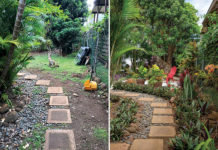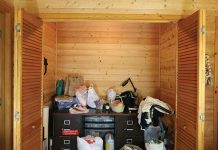
- Test your soil. Find out if you have any mineral and micro-nutrient deficiencies, as this can affect the plants’ ability to draw nitrogen and other important nutrients for healthy growth and resistance to pests. You can get a good mineral and micro-nutrient sample done by Perry Agricultural Lab in Missouri.
- Know your pests. The CTAHR (College of Tropical Agriculture & Human Resources) extension office at Maui Community College will identify pests for you.
- Follow the ebb and flow of nature. Sometimes your garden will look beautiful and other times it will look tired. It’s all part of the cycle; let it not be perfect.
- Sometimes benign neglect will yield the best results.
- Compost is your friend.
- Good compost should be composed of 25 parts carbon (woody, decaying material) to 1 part nitrogen (green leafy material).
- Compost should not smell. This can be achieved by making sure compost heats up to at least 120 degrees F, but not hotter than 160 degrees F.
- Compost, when finished, will be light and fluffy.
- Use companion plants (ex: garlic, onions, chives, and Mexican marigolds) to help with pest and disease problems.
- When growing vegetables, rotate your crops. Legumes (beans, peas) will fix nitrogen; root crops like carrots and beets will aerate the soil.





